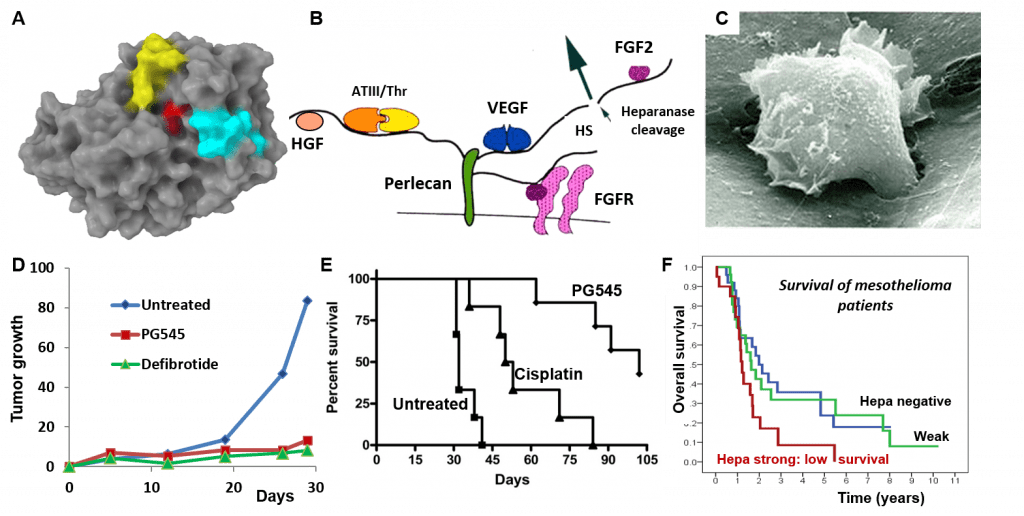Mesothelioma Successfully Curbed in Animal Models
Israeli and American Researchers Have Successfully Curbed Mesothelioma in Model Animals
HAIFA, ISRAEL and NEW YORK (May 24, 2018) – An international team led by researchers from the Technion-Israel Institute of Technology and NYU Langone have succeeded in stopping the growth of mesothelioma in model animals by inhibiting the heparanase enzyme.
Mesothelioma is a cancer that develops in the mesothelium – a thin membrane that protects the internal organs of the chest and abdomen. In most cases, the disease is caused by exposure to asbestos. This malignancy is resistant to most anticancer drugs and currently has no effective treatment, so there is a high level of interest in and importance to the joint study published in the Journal of the National Cancer Institute (JNCI).
The study was conducted under the guidance of Technion’s Prof. Israel Vlodavsky and his colleague, Prof. Harvey Pass of New York University. The research at Technion was led by Drs. Uri Barash, Moshe Lapidot, and Neta Ilan. Analyzing mesothelioma samples collected by Prof. Pass over the years, the NYU researchers validated the clinical significance of heparanase in the pathogenesis of mesothelioma.

Involvement of heparanase in the pathogenesis of mesothelioma. A. Schematic structure of the heparanase enzyme showing its active site (red) and substrate binding domains (yellow and blue). B. Scheme showing growth promoting factors (i.e., VEGF, FGF) bound to heparan sulfate (HS) saccharide chains. These factors are released upon cleavage of HS by heparanase (arrow), thereby promoting tumor growth and vascularization. C. Electron micrograph of a cancer cell invading through the blood vessel wall. D. Heparanase inhibitors (PG545 – Red; Defibrotide – green) profoundly inhibit the growth of human mesothelioma tumors in mice. E. The survival time of mice bearing mesothelioma tumors is extended upon treatment with the heparanase inhibitor PG545 to a much higher extent than treatment with chemotherapy (Cisplatin). F. Survival time of mesothelioma patients expressing high levels of heparanase (red) is shorter than patients expressing low levels of the enzyme (green and blue).
The joint research group (Technion-NYU Langone) found that mesothelioma cancer cells use the heparanase enzyme to break tissue barriers surrounding the developing tumor and attract blood vessels to nourish it. Moreover, the dissolution of the extracellular matrix causes the release of growth-promoting proteins and thus accelerates the development of the tumor. The heparanase secreted by cancer cells and the microenvironment of the tumor triggers a vicious circle in which inflammation and growth strengthen each other.
The researchers succeeded in disrupting this vicious cycle, combating mesothelioma by means of heparanase inhibitors. The study showed, first, that heparanase accelerates the progression of the disease in mesothelioma patients: the greater the amount of heparanase in the patient, the shorter their life expectancy. It also showed, in mouse model experiments, that inhibiting heparanase gene expression inhibits tumor growth. The heparanase inhibitors (PG545 and defibrotide) significantly inhibited tumor growth and greatly extended the survival ability of treated mice. The use of heparanase inhibitors was more effective than conventional chemotherapy such as Cisplatin, currently used to treat this malignancy.
The findings provide some hope for mesothelioma patients around the world, and the researchers will soon be conducting a clinical trial to examine the therapeutic potential of heparanase inhibitors in this deadly disease.
The research was supported by the Laura and Isaac Perlmutter Foundation. Prof. Vlodavsky is a member of the Technion Integrated Cancer Center (TICC) at the Rappaport Faculty of Medicine, and is the world’s leading expert in the study of the heparanase enzyme. His research endeavor led to the appreciation of this enzyme as a target for cancer therapy, a notion that is supported convincingly in the current mesothelioma study.
Prof. Pass is Director of the Thoracic Surgery Division at the Langone Medical Center in NYU and a member of the Perlmutter Cancer Center. Prof. Pass is a leading physician and investigator of mesothelioma and has been collecting tissue samples from his patients since becoming Head of Thoracic Oncology at the National Cancer Institute (NCI). Today, this database contains hundreds of frozen mesothelioma samples, which were used to identify the role of heparanase in mesothelioma.
Click here for the paper in Journal of the National Cancer Institute (JNCI)


